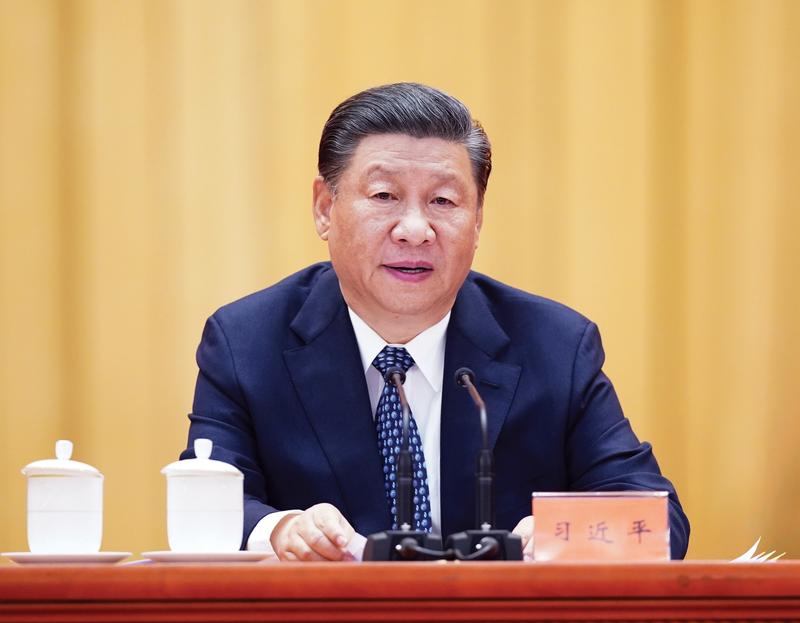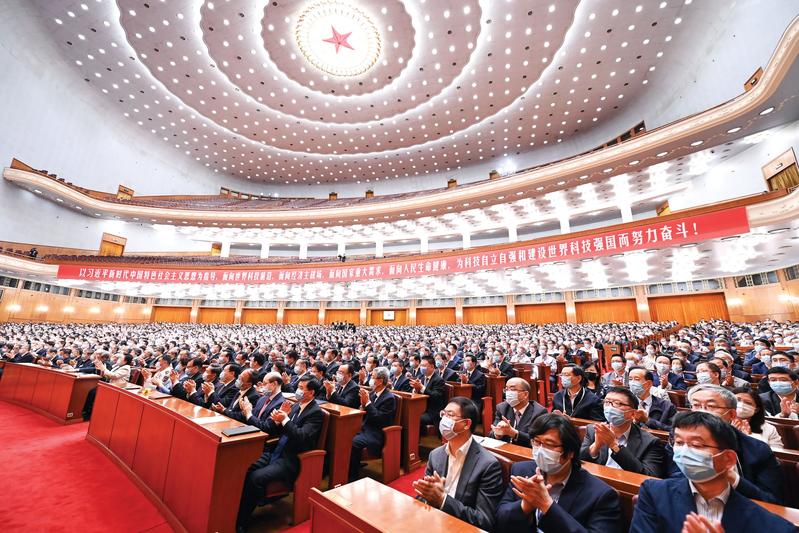 President Xi Jinping addresses the general assemblies of the Chinese Academy of Sciences and the Chinese Academy of Engineering, and the National Congress of the China Association for Science and Technology. Scientists and engineers attended the meetings on May 28 in Beijing. (LI XIANG / XINHUA)
President Xi Jinping addresses the general assemblies of the Chinese Academy of Sciences and the Chinese Academy of Engineering, and the National Congress of the China Association for Science and Technology. Scientists and engineers attended the meetings on May 28 in Beijing. (LI XIANG / XINHUA)
Noted scientists and engineers hailed President Xi Jinping’s latest speech on science and technological innovation as insightful, inspiring and instructive, saying they will fulfill Xi’s call to enhance basic research, train quality professionals, promote international collaboration and conduct reforms to unleash the full potential of those working in science.
The president called on May 28 for the accelerated transformation of China into a scientific and technological powerhouse.
Xi, who is also general secretary of the Communist Party of China Central Committee and chairman of the Central Military Commission, urged the Chinese scientific community to make more breakthroughs in core technologies and help the country achieve a higher level of self-reliance and strength in science and technology to provide strategic support for national development.
Meanwhile, the country will enhance international cooperation in areas such as climate change and human health, and proactively integrate into the global innovation network to contribute more in building a community with a shared future for mankind, Xi said.
He made the remarks while addressing the 20th general assembly of academicians from the Chinese Academy of Sciences, the 15th general assembly of academicians from the Chinese Academy of Engineering, and the 10th National Congress of the China Association for Science and Technology in Beijing on May 28.
Xi urged the scientific community to be aware of the challenges of the time, break new ground and make new findings in key sectors, train higher-quality talent and proactively participate in the global governance of science and technology.
Wang Xi, a material scientist and a CAS academician, said Xi’s speech was both inspiring and instructive as it listed the five main objectives for Chinese scientists, namely enhancing basic research, institutional reforms, international cooperation, talent training, and increasing the nation’s science and technology capability in strategic sectors.
“The point that caught my attention is Xi’s emphasis on the role of an effective market and a capable government in science and technology innovation,” Wang said, adding that Guangdong province provides an example of this idea in action.
Guangdong is one of the most innovative regions in China, boasting over 53,000 high-tech companies and a 320 billion yuan (US$50.3 billion) research budget in 2020, Wang said. What made Guangdong stand out was that private companies contributed over 80 percent of the total budget and around 90 percent of the total research personnel in the province last year.
In recent years, China’s science and technology capabilities have witnessed a qualitative leap, characterized by many historic achievements and breakthroughs in innovations, basic research, strategic high-tech fields, and high-end manufacturing, Xi said.
These feats include the country’s Mars and lunar probes, the Beidou Navigation Satellite System, the construction of the Chinese space station, new quantum computers and deep-sea submersibles. He also mentioned that China has become a global leader in fields such as 5G communication and image and voice recognition.
“Reality has proven that our indigenous innovation undertakings have a bright future, and our science workers are high achievers capable of accomplishing great deeds,” he said.
 President Xi Jinping addresses the general assemblies of the Chinese Academy of Sciences and the Chinese Academy of Engineering, and the National Congress of the China Association for Science and Technology. Scientists and engineers attended the meetings on May 28 in Beijing. (LI XIANG / XINHUA)
President Xi Jinping addresses the general assemblies of the Chinese Academy of Sciences and the Chinese Academy of Engineering, and the National Congress of the China Association for Science and Technology. Scientists and engineers attended the meetings on May 28 in Beijing. (LI XIANG / XINHUA)
However, China’s ability to make original breakthroughs is still relatively weak, Xi said. The nation also needs to improve the effectiveness of its innovation system, make better use of its research resources and optimize its systems for training talents and evaluating scientific output, he added.
Xi said State laboratories, national research institutions, high-quality research universities and leading science and technology enterprises are all key components of the nation’s strategic science and technology capability.
He called for China’s scientific community to tackle the world’s scientific and technological frontiers, create innovations that can serve the economy and major national needs, and promote the health and well-being of the people.
Research universities should become a main driving force behind basic research and major scientific and technological breakthroughs, while leading enterprises should help modernize the nation’s basic industrial capabilities and industrial chains, he said.
Meanwhile, provincial governments play a critical role in identifying strategic needs and guiding research efforts.
Peng Shou, a senior engineer and a CAE academician, said Xi’s speech will encourage continued efforts to overcome key obstacles in developing advanced glass materials, such as those used for displays and in medicine, for which China currently relies heavily on imports.
“We will push China from being just a major material producing nation to a global leader in materials science and manufacturing,” he said. This will require Chinese engineers to be inquisitive, hardworking and patient, and also to be able to identify and develop potential talent, he added.
Xiao Wenjiao, a geologist and a CAS academician, said China needs to invest more in basic research and talent training, especially in less developed but strategically critical parts of the country, such as the Xinjiang Uygur autonomous region.
China should build an open innovation ecosystem and take part in the global governance of science and technology as it is a shared treasure of mankind, Xi said.
Meanwhile, China will need to tap into the innovative potential of various talents, he said. To achieve this, the nation will attach greater emphasis to cultivating high-end talents and innovative research teams, while granting research institutions and scientists more autonomy, freeing them from unnecessary paperwork, appraisals and other distractions.
“When the president said ‘researchers should be spared from spending too much time on worthless socializing’, the audience spontaneously burst into applause,” said Jiang Peng, chief engineer of China’s Five-hundred-meter Aperture Spherical Telescope.
Jiang applauded the improvement of the evaluation system that President Xi mentioned.
“Evaluation is a powerful driving force for science and technology innovation, so a reasonable evaluation mechanism is particularly important. The current mechanism is too complex, consumes too much energy and creates competition that discourages researchers’ work,” Jiang said.
Xi said the nation will optimize its policies to attract high-end foreign talents to work or have exchanges with peers in China. He called on the nation’s scientific community to set its sights on the future and the world, and enhance its openness, trust and cooperation with international peers.
You Zheng, vice-president of Tsing-hua University and an academician of the Chinese Academy of Engineering, said he had heeded Xi’s call to enhance basic research and produce more original and leading breakthroughs.
“We will double our efforts in nurturing innovative talents that the nation needs, and make our contribution in enhancing self-reliance and our strength in science and technology, as well as China’s transformation into a global leader in science and technology,” You said.
Ma Xingfa, vice-president of the Shanghai Association for Science and Technology, said the China Association for Science and Technology and its subsidiaries are key channels for international exchanges.
“We will enhance dialogue and cooperation with international science organizations, universities, high-tech parks and companies,” he said. “This will create platforms for close and long-term cooperation.”
Zhang Yangfei contributed to this story.


